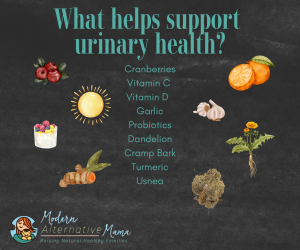By Rustina
The itching. The burning. Trying to discreetly find comfort. The nagging need to constantly run to the bathroom. Then, the fever, the chills, and the lower back pain. Do you know the feeling? Aaargh, I hated having UTIs.
In my 20s, I would get them every few months. I was so busy trying to do everything a young girl was “supposed” to do – working full time, college full time, being strong, staying in shape, being intimate with my hubby, and enjoying every moment with loved ones – that I didn’t take great care of myself. I ate quick, processed meals and greasy cafeteria food. I went out in the evenings and stayed cooped up in buildings all day long. As much as I was running back and forth everyday, getting a UTI was not the hurdle I wanted to be jumping!
Feeling sick, hurting, and running to the bathroom is not how anyone wants to spend their time, much less repeat it every few months!
What is a Urinary Tract Infection, and why do we get them?
The urinary process begins in the kidneys, two bean-shaped organs located in the back of the abdomen. The kidneys filter the incoming used blood to remove waste products, excess water, and electrolytes. Those become urine. Urine produced in the kidneys flows into the ureters, two narrow tubes that carry the urine from the kidneys to the bladder. Contractions of the ureters help push urine downward into the bladder. The bladder is a muscular, hollow organ that serves as a storage reservoir for urine. It can expand as it fills with urine. When the bladder is full, stretch receptors signal the need for urination. The urethra is a tube that connects the bladder to the external body. When a person voluntarily relaxes the urinary sphincter muscles, urine flows from the bladder through the urethra and out of the body.
According to research, more than half of all women will develop a UTI in their lifetime. Many will even end up dealing with recurrent urinary tract infections (rUTIs), like me. Women are more likely to have UTIs; men only make up about 12% of infections (1). A urinary tract infection (UTI) is when there is an infection in some part of the urinary system.
Rarely but occasionally, it can get very serious, and turn into sepsis. In the case of a UTI, it is called urosepsis (2). The definition of “sepsis” has undergone many changes, but was defined in 2016 as a “life-threatening organ dysfunction caused by a dysregulated host response to infection.”
Signs of a Lower UTI (in the urethra and bladder):
- Painful, burning, itching feeling when urinating
- Frequent urination or feel the need to urinate even if you don’t
- Pressure or cramping in the pelvic area or lower abdomen
- Dark, cloudy, or strange smelling urine
Signs of an Upper UTI (infection has traveled up to the ureters and kidneys):
- Fever
- Chills
- Lower back pain or pressure
- Nausea
- Vomiting
- Dark, cloudy, or strange smelling urine
Signs of Urosepsis
- UTI suspected/present
- Any of the above symptoms
- Abnormalities in body temperature (warm skin)
- Heart rate distress (bounding pulses, tachycardia)
- Respiratory rate distress
- Kidney dysfunction evidenced by decreased urine output
- Encephalopathy with an abrupt change in mental status
- Low platelet activity
Infections in the lower urinary tract are also called “uncomplicated” and upper infections considered “complicated” UTIs.
Causes of UTIs
Bacteria
The most common cause of a UTI, according to this study, is E Coli. Although there are other bacteria that can cause an infection as well, like proteus, klebsiella, and enterococcus (3).
Since the allopathic method is to treat with antibiotics, there are some cases of infections being multi-drug-resistant. Bacteria become drug resistant by learning to produce enzymes that deactivate antibiotics and making the target area smaller that the antibiotic would target (4).
Bacteria enters the urinary tract during a bowel movement cleaning, sexual intimacy, or during other times where anything foreign to the body enters. Sometimes the bacteria stays lower in the urethra or bladder. However, sometimes it goes up into the upper urinary tract like the ureters or kidneys.
There is a whole world of gut flora in the urinary tract that strives to stay balanced and healthy (5). According to this study, it functions to balance the pH levels, prevent infections, and prevent other urogenital diseases.
Yeast, in particular, Candida albicans, can cause an infection in the lower urinary tract infection. The symptoms are the same as other lower UTIs with an increased likelihood of the burning sensation during urination (6). You can learn more about yeast in Everything You Need to Know About Candida.
Other Microbial Contaminants
Any time something enters the vaginal opening like during sexual activity, it can bring in an impurity that can cause a UTI, such as Sexually Transmitted Diseases (STDs) and other toxins (7,8). It can also cause irritation or a disruption inside the vaginal opening causing an infection by creating a spot for a “bad” bacteria to thrive (9).
If a male partner has used lotions or strong soaps on his member without thoroughly washing himself first, that can disrupt the microbiome. It is just like using douches and sprays, they can wreak havoc on the microbiome down there. Spermicides on contraceptives and, if sensitive to latex for example, this may cause irritation allowing for “bad” bacteria to thrive in (10).
Factors that Heavily Contribute to Infections
Bladder Issues
Problems with the structure or function of the bladder can also cause a UTI to develop. An obstruction in the urethra or bladder that causes a place for the bacteria to start growing and reduces the bladder’s ability to fully empty (11). Not emptying the bladder fully, leads to unhealthy pH levels, bacteria, or other toxins building up.
If the nerve to the bladder does not send the signal to empty the bladder properly from damage like a lesion along the nerve, then that would have the same effect (12). Another reason the bladder may not empty often enough is not drinking enough fluids. Proper hydration is important!
Vitamin D Deficiency
All nutrients are important, and we should strive to have adequate levels and balance of all nutrients. Vitamin D is a strong force in the immune system. When levels are low, our immune system is not as well regulated making it easier for bacteria, viruses, and other toxins to grow anywhere in the body. Vitamin D not only makes the immune system stronger to fight off an active infection, but can help reduce the chances of infections as well (13).
There has been a correlation recognized with low Vitamin D levels and the onset or worsening of many infections and conditions (14). With the increase in hospital acquired infections and drug-resistant strains, supplementing vitamin D is being researched more and more all the time (15).
Learn more in What You Need to Know About Vitamin D
An Estrogen Connection
When Estrogen decreases, the linings that inhabit the gut flora and UT flora thin. This disrupts the microbiome thus leading to less protection against UTIs (16). Learn more about estrogen and other hormones in What No One Wants To Tell You About Hormone Balance Guide and the blog 7 Ways to Naturally Balance Your Hormones.
Natural Remedies for UTIs
Over the years, many natural remedies have been shared. Here are some potential helpers:
Cranberries
Cranberries are one of the most popular natural remedies for UTI prevention and support. Cranberries help in a variety of ways. Properties in the cranberries support the gut microbiome and the health of the lining where the microbiomes in our body dwell. Cranberries are also antimicrobial, antibacterial, antifungal, and antiviral. They have shown to be effective against a variety of infections including E. Coli and candida (17).
Not only are cranberries helpful for UTIs, but they also have properties that help support blood sugars, metabolic processes, obesity, tooth decay/periodontitis, and Helicobacter pylori bacteria in the stomach (18).
Cranberries can be added to your regular diet pretty easily. They are great dried as a plain snack or sprinkled into yogurt, salads, or as part of a “trail mix.” Cranberries are also easy to find in capsule form – but be sure to check the ingredients out first! It can be taken in powdered form (like Earthley’s Super Food Powder) and mixed into smoothies or applesauce. Cranberries can be used in tinctures like in Earthley’s UT Relief.
Learn more about cranberries in our Natural Wellness Classes for Kids (Week 6).
Vitamin C
We cannot make our own vitamin C, but we need it for proper immune function. It provides increased cellular immunity function for both prevention and mounting an “attack” against invading pathogens (19). Ideally, you want the full benefits of vitamin C, so you’ll need to consume it every day – not just at the start of infection symptoms. Some people struggle to get the recommended amount so they supplement with high dose ascorbic acid. Ascorbic acid is a component of vitamin C along with other components like the flavonol rutins (20). Most supplements you find on a store shelf are isolated, high dose ascorbic acid. Whole food sources are often much more bioavailable and easier on the digestive tract.
My favorite vitamin C supplement is Earthley’s Immune-Aid. It is made from two of the highest sources of whole vitamin C: organic camu camu, organic acerola berry, and organic orange peel powder. Just add a 1/4 to 1/2 teaspoon a day to drinks, smoothies, or applesauce. I will use that amount more frequently during the day if I have signs of an infection. If you aren’t a fan of powders, Earthley also has a new Vita-C tincture.
How to add whole food vitamin C to your diet:
- Camu Camu
- Acerola Berries
- Citrus fruits
- Potatoes
- Tomatoes
- Green peppers
- Cabbage
- Strawberries
- Broccoli
And many more fruits and veggies!
Vitamin D
As mentioned above, getting an adequate supply of vitamin D can help reduce the chances of getting an infection, and lessen the risks during an infection.
Getting 10 – 30 minutes of mid-day sunlight daily as many days per year as possible is the most ideal. Sun is the best source of vitamin D, and how our body was designed to get it. How much is absorbed will depend on several things:
- How much skin is exposed vs how much is blocked by clothing or harsh sunscreens
- Magnesium levels (magnesium is required for the biosynthesis of vitamin D – if you are low on magnesium, try Earthley’s Good Night Lotion or this Magnesium Oil DIY)
- How high the sun is in the sky while you are outside (the higher above you, the stronger the rays hitting you)
- Cloud coverage or things on our skin blocking the sun’s rays
When you are not able to get in the sunlight, consume foods with vitamin D for the body to use:
- Fish like salmon, cod, and tuna are high in vitamin D
- Cod Liver Oil (try Earthley’s Cod Liver Oil and Vitamin D Cream)
- Mushrooms have a little vitamin D (shiitake often has higher amounts than other varieties) for a vegan friendly option. There is a new Mushroom Tincture from Earthley also.
- Beef Liver (DIY: How to Make Liver Pills)
- Egg yolks
Garlic
Garlic has long been used for its strong antibacterial effects including against E. Coli, Pseudomonas, Staph, and many others. It is also antifungal, providing support against Candida, Trichophyton, and many more to help the balance between “good” and “bad” bacteria in the microbiome (21). Garlic is also a strong antioxidant, anti-inflammatory, and immune modulator to help against infections including UTIs. It also has a diuretic effect to help encourage healthy urine elimination (22). Garlic has so many great benefits for gut health in general that Kate included it in the Metabolism Tincture.
Garlic is another easy one to add to your diet – I sprinkle it on top of nearly everything! You can also add garlic cloves to soups, bone broths, or make your own honey-fermented garlic cloves! Just peel the garlic cloves and cover them all well in honey. Store the sealed jar in a cabinet remembering to turn the jar occasionally to make sure the honey covers it well. After a couple weeks, just pluck out a garlic clove as a snack. Added bonus – honey has some great antibacterial properties too!
Probiotics
We know that gut microbiotics are very important in reducing the risks of a “bad” bacteria overgrowth so adding “good” probiotics makes sense. There are studies that oral consumption of probiotics as well as vaginal application of probiotics is helpful to restoring the microbiome that protects against UTIs. The strain Lactobacilli is found in fermented milk products like yogurt (23). These seem to be the most commonly researched probiotics for urinary health. Lactobacilli has been shown to “prevent the adherence, growth and colonization of uropathogenic bacteria”(24). A study with 324 women, determined drinking 100% berry juice with milk fermented dairy products showed a decrease in UTI contraction.
Ways to add Probiotics to your diet:
Dandelion root
To help support the antibacterial effects while also providing a diuretic to help eliminate fluids and support the liver detox. Dandelion is a great herb to add to your natural remedies cabinet! (25, 26, 27) You can often forage it right from your own backyard. It is easy to add to salads, teas, or use in tincture form.
Cramp bark
Cramp bark helps support female hormones like estrogen, provides pain relief, and has shown helpful with ureteral stones (28, 29)
While eating cramp bark raw is not recommended, drying and using in tea or tincture form is most common. Read more at Herbal Profile: Cramp Bark.
Turmeric
Inflammation is often a contributing factor in UTIs (30) and one of the best supporting anti-inflammatory herbs is turmeric (and its supporting activating spice, black pepper. It has also been indicated in helping against UTIs specifically (31).
Turmeric and black pepper go well on many dishes, especially with garlic too. I add a lot of it to my bone broths and soups for the added benefits as well as the golden coloring. It is easy to find in powdered form, capsule form, or in tinctures, like Earthley’s UT-Relief.
Usnea
This is an amazing herb that has been used for UTIs for a long time. You can read more about this anti-inflammatory, antibacterial, and immune supporting herb and how to use it in the blog, Herbal Profile: Usnea.
Marshmallow Root
Marshmallow root is sometimes used for its soothing and anti-inflammatory properties. It may provide relief from the discomfort associated with UTIs. This can be used in teas or tinctures.
What to do about the symptoms?
Here are my go-to remedies for dealing with the symptoms of a UTI.
- External Discomfort/itching: No More Yeast Salve has great herbs (like cloves, cinnamon, and calendula) and oils (like neem) for fungi situations.
- Cramping: Earthley’s UT-Relief with Cramp Bark and Turmeric
- Yeast: Candida Cleanse naturally fights yeast while bringing your gut flora back into balance.
- Fever/Chills/ill feeling: Feel Better Fast supports your body’s natural immune system so that it works more efficiently.
- Stress: Adaptogenic Immunity is a combination of 5 herbs that can support the immune system, improve the body’s ability to cope with stress, and nourish you for total body wellness.
Tips to Avoid UTIs
- Wear loose clothing so there are less areas disturbed or over heating for bacteria to grow.
- Avoid harsh laundry detergents that can upset the microbiome balance/ Try natural, effective, and safe ingredients for washing laundry – try Earthley’s laundry soap.
- Wipe front to back when you use the bathroom to avoid feces getting in the urethra (and teach your kiddos!)
- Sex tips: Be sure you and your partner have cleaned and rinsed well, urinate after sex, avoid using contraceptive ingredients that you are sensitive to – when possible. (32,33,34,35)
- Drink plenty of water and urinate whenever the need arises – don’t hold it. Water intake increase can reduce UTIs (36)
- Take showers instead of or after baths – use herbal tea baths like Earthley’s Detox Bath if you do choose to lay in the tub.
- Avoid using sprays, douches, or other feminine products that disturb the vaginal pH and microbiome (37).
- Avoid foods that irritate the bladder like (38,39):
- Artificial sweeteners
- Caffeine
- Alcohol
- Inflammatory foods
- Processed sugar
- Tip: Plants are less acidic so they are helpful to add to the diet without causing upset to your pH levels!











I was surprised not to see my favorite go-to for UTI’s:
The herb, Uva Ursi
It can be found in a tincture or in pills; both work equally well.
I was having UTI’s quite often (getting too hot & sweaty at work) and the usual acidic products (cranberry, etc) had stopped working. I read somewhere that sometimes going to an alkaline internal level will help. I was miserable and couldn’t get in to see my doctor for 3 more days.
I used the tincture that first time 3 times
Daily and by the time I had my appointment, my UTI was gone! My doctor even questioned whether I’d even had a UTI. I explained what I had tried and my urine’s pH was 8.5 (very alkaline). He just scratched his head and said try it again next time and then you’ll know if it’s that or something else. It’s worked every time!
I’ve tried D-Mannose also, but I just don’t think it works as well or as fast.
Thanks for a great article!
We are glad that it worked well for you! Uva Ursi is a great herb for UTIs also! There are concerns though for some people to use it safely, and should be used only moderately for anyone so I chose not to add it since there are many other great options. The safety concerns for Uva Ursi are for children, elderly, pregnant, breastfeeding, or those with high blood pressure. https://www.rjwhelan.co.nz/herbs%20A-Z/uva-ursi.html